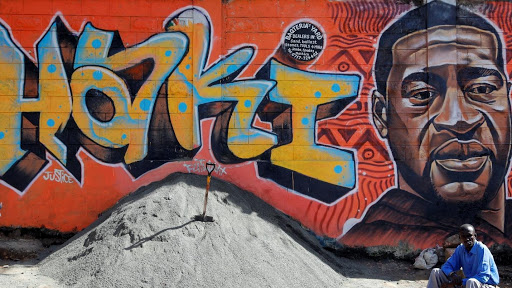By Tanya Maringo
It was 9 pm in my country Kenya and I was feeling fresh after a hot shower and was looking forward to having a relaxing dinner. My jubilant mood was about to swiftly plummet for days on end. So rapid was my devastation after I watched the video of George Floyd last breath at the hands of a callous police officer that I immediately lost my appetite.
I honestly wish I had not watched that video because one simply cannot unsee it. I felt my heart physically ache. My first reaction was complete disbelief and as the video continued, I thought – surely someone is going to stop this. No one can just stand by and watch this happen. Someone? Anyone? As the seconds ticked by, I knelt on the cold hard floor– because my body could not hold itself up any longer. That night I was plagued by nightmares of the words “I can’t breathe”.
Many Africans, at least within my country Kenya have been quick to empathize but also to the state beyond a doubt that this is “not our business” and we have our own pressing problems here at home. Indeed, we do have a myriad of human rights violations in our own back yard, but I respectfully disagree. We cannot simply shrug our shoulders at the injustice of brutality against people of color. Africa mourns its children littered across the globe struggling to survive – fighting to breathe. So, this is properly our business and always will be. “Injustice anywhere is a threat to justice everywhere.” Martin Luther King.
Furthermore, if you search deeper this discussion is much bigger than George Floyd. It is about endemic, insidious racism that we are afraid to talk about and have therefore accepted as normal. Right from the beginning of colonization the distortion of truth has been craftily perpetuated into our education, social and economic systems. We have now realized the fallacy of black inferiority and therein lies the tyrant’s problem – our emancipation from mental slavery. It is about the history of our ancestors who were kidnapped, incarcerated, and shipped off as slaves to foreign, hostile territory. African immigrants have been on the receiving end of discrimination, racial profiling, and arbitrary arrests in the USA and many other countries abroad.
In effect, we could say that the African American community is operating as a domestic colony. George Floyd has left us but imagine him telling our ancestors that we are fighting, that this uprising has led to an unprecedented unity of black people all over the globe. Imagine that! In the same way, this conversation is also about neocolonialism and the imperialist exploitation that we experience today in the guise of “development” which is just as crippling as the breath being taken from our lungs. We need to amplify the voices of Africans on the continent and in the diaspora. It is essential that we stand in solidarity. We need to embrace Pan-Africanism until every person of African descent is genuinely and truly liberated. That is what these protests are about, centuries of passive acceptance, and the cry of freedom.
We must acknowledge that our capacity to demand justice for our own citizens has been largely minimal and this gruesome act has set the stage for us to discuss human rights within our own borders. It is our duty to see, listen, and be inspired by actions across the world to liberate black people and replicate these advocacy initiatives within our own context. I am glad to note that this has created a spark within the youth about their potential and capacity to legally demand their rights. It is the first hopeful tide of change. Our responsibility is therefore twofold: To actively advocate against all forms of racism, bigotry, and discrimination based on the color of our skin. Secondly and very importantly we must use this time as an opportunity to lobby against extrajudicial killings, police violence in Africa by our own leaders.
Dear African, in summary, this conversation is about the illusion of freedom that we have unquestionably accepted today. This is a platform for us to collectively take a stand against an age-old battle. It is time to change things for our children and the generations thereafter.
I and many other Africans would like to stand united with black people globally in the struggle against black oppression. I urge you to join this historical struggle today. Let us take a minute of silence for all the black people, known and unknown who have died at the hands of ill-conceived supremacy and racism. Rest in Power Comrades – Rest in Power!
Tanya Maringo is an International Development Consultant, Humanitarian aid worker, and founder of Blink International social entrepreneurship in Nairobi.














